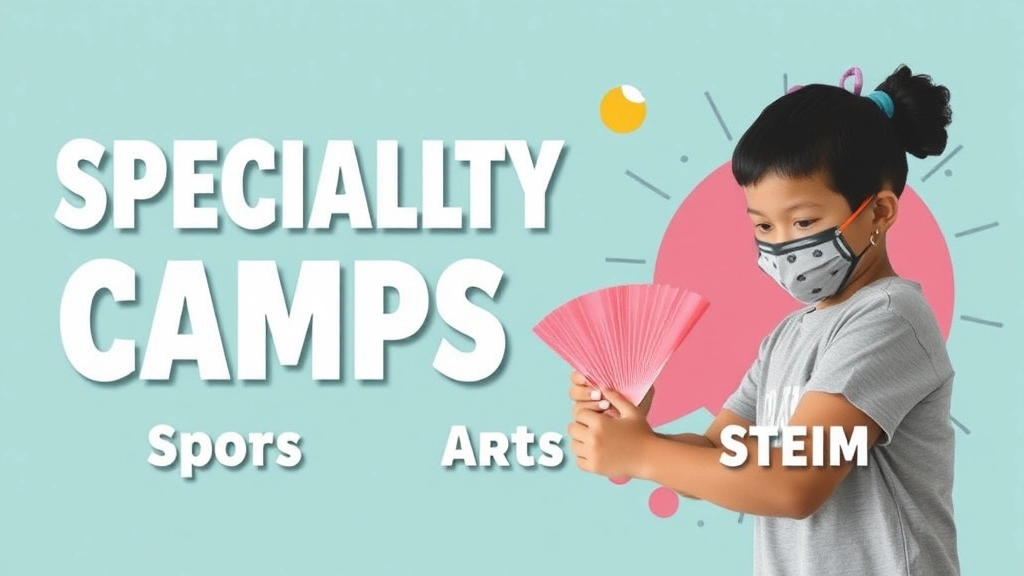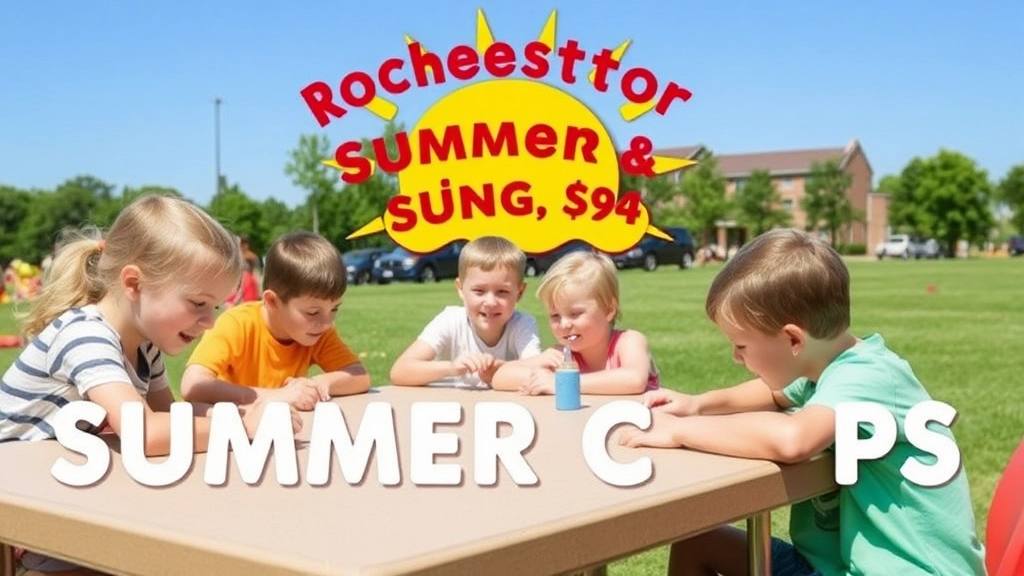Planning the Perfect Summer for Your Child
Planning the perfect summer for your child can be a daunting task, especially with so many options available. Rochester Summer Camps offer a diverse range of experiences tailored to different interests and age groups. From traditional day camps to immersive overnight adventures, and specialty camps focusing on sports, arts, and STEM, there’s something for every child. This guide will help you navigate the various types of camps, highlight top choices, and provide tips on choosing the right camp, ensuring safety, and preparing your child for an unforgettable summer experience.
Types of Camps
Whether you’re looking for the convenience of day camps, the full immersion of overnight camps, or specialized programs that cater to your child’s unique interests, Rochester has it all. We’ll discuss registration deadlines, fees, and key safety measures to look for, backed by testimonials and reviews from parents who have been there.
What You’ll Learn
- Registration deadlines
- Fees
- Key safety measures
- Testimonials from parents
By the end of this article, you’ll have all the information you need to make an informed decision and ensure your child has a fun, enriching, and safe summer. Dive in to discover the best Rochester Summer Camps and make this summer one to remember!
Types of Summer Camps in Rochester
What types of summer camps are available in Rochester? That’s a question I hear all the time from parents. They want to know what options are out there for their kids. So, let’s dive right in and break it down.
Traditional Summer Camps
First up, we’ve got the traditional summer camps. These are the classic, all-encompassing camps that offer a bit of everything. Think swimming, hiking, crafts, and campfires. These camps are perfect for kids who want a mix of activities and a taste of everything summer has to offer.
Examples of Traditional Camps:
- Camp Arrowhead: Located just outside of Rochester, it offers a mix of outdoor activities and team-building exercises.
- Camp Stella Maris: A bit of a drive, but worth it for the lakefront activities and classic camp experience.
Day Camps
Next, let’s talk about day camps. These are ideal for younger kids or those not quite ready for an overnight stay. They run during the day and kids get to go home at night.
Benefits of Day Camps:
- Convenience: Easy drop-off and pick-up.
- Flexibility: Often available in weekly sessions.
- Cost-effective: Typically cheaper than overnight camps.
Overnight Camps
Overnight camps are the full-on experience. Kids stay for a week or more, fully immersed in camp life. This is where lifelong friendships are made and independence is fostered.
Why Choose Overnight Camps:
- Immersive Experience: Kids get the full camp vibe, 24/7.
- Independence: Great for building self-reliance and confidence.
- Deep Bonds: Strong friendships form when kids spend extended time together.
Specialty Camps
Now, if your child has a specific interest, specialty camps are the way to go. These camps focus on a particular area, like sports, arts, or STEM (Science, Technology, Engineering, and Math).
Types of Specialty Camps:
- Sports Camps: From soccer to swimming, these camps focus on athletic skills.
- Arts Camps: Perfect for budding artists, musicians, or actors.
- STEM Camps: For the future scientists and engineers, these camps offer hands-on learning in a fun environment.
Adventure Camps
Don’t forget about adventure camps. These are for the thrill-seekers and nature lovers. Activities might include rock climbing, kayaking, or wilderness survival skills.
Adventure Camp Highlights:
- Outdoor Skills: Learn how to navigate and survive in the wild.
- Thrill Activities: High-adrenaline fun like zip-lining and rafting.
- Team Building: Lots of group activities that build camaraderie.
Special Needs Camps
Lastly, there are special needs camps designed to accommodate children with various disabilities. These camps provide a supportive environment with tailored activities to ensure every child has a great summer.
Features of Special Needs Camps:
- Tailored Programs: Activities designed to meet specific needs.
- Trained Staff: Professionals skilled in working with special needs children.
- Inclusive Environment: A space where every child feels welcome and supported.
Top Summer Camps for Kids

Hey, parents!
Looking for the top summer camps for kids in Rochester?
I get it.
Finding the perfect camp can feel like a mission.
You want your child to have fun, make friends, and maybe learn a thing or two.
But where do you start?
Here’s a breakdown of the best options out there.
Rochester’s Best Day Camps
Day camps are a hit for those who prefer to keep it local.
- Rochester Museum & Science Center: Perfect for little explorers. Think hands-on science experiments and interactive exhibits.
- Camp Arrowhead: Offers a mix of outdoor activities like swimming, archery, and arts and crafts.
- YMCA Day Camps: These are all about building character and having fun. Plus, they’re everywhere.
Top Overnight Camps
Overnight camps are the real deal for immersive experiences.
- Camp Stella Maris: Located on Conesus Lake, this camp is a classic. Swimming, sailing, and campfires every night.
- Camp Good Days and Special Times: Aimed at kids facing serious health challenges. It’s all about creating joy and memories.
- Camp Cory: Another YMCA gem, this one’s on Keuka Lake. It’s got everything from sailing to drama.
Specialty Camps: Sports, Arts, and STEM
Got a kid with a specific interest?
- Sports Camps: Rochester Red Wings Baseball Camp, Nazareth College Soccer Camp. These camps focus on skill-building and teamwork.
- Arts Camps: Rochester Broadway Theatre League offers acting, dancing, and singing. The perfect stage for future stars.
- STEM Camps: Check out iD Tech Camps at the University of Rochester. Coding, robotics, game design – you name it.
Real Talk: Choosing the Right Camp
So, how do you choose?
- Interests: What does your kid love? Sports? Arts? Science?
- Budget: Some camps can be pricey. Look for scholarships or financial aid.
- Location: Day camps close to home or overnight camps a bit farther away?
- Duration: A week-long camp or just a few days?
Why These Camps Stand Out
Parents rave about these camps for a reason.
- Engaging Activities: No boring moments. Just pure fun and learning.
- Experienced Staff: Trained professionals who know how to handle kids.
- Safety First: All camps follow strict safety protocols. Peace of mind for you.
Day Camps vs. Overnight Camps
Alright, let’s tackle the big question: Day Camps vs. Overnight Camps. Choosing between the two can feel like a huge decision, right? I get it. So, let’s break it down in a way that makes it easy to decide what’s best for your kid.
What’s the Difference?
Day Camps:
- Home at Night: Kids come home at the end of the day.
- Routine: Perfect for younger kids or those not ready for an overnight stay.
- Cost: Generally cheaper than overnight camps.
- Local: Usually within driving distance, so no need for long travel.
- Flexibility: Easier to fit into your summer schedule.
Overnight Camps:
- Full Immersion: Kids stay at the camp for a week or more.
- Independence: Great for older kids who are ready to spread their wings.
- Activities: Often offer more extensive activities due to the longer stay.
- Social Skills: Living with peers can help build stronger friendships and social skills.
- Experience: Provides a unique, immersive experience that can be life-changing.
Real Concerns and Questions
Is my kid ready for an overnight camp?
This is a biggie. If your child has never been away from home for more than a night, starting with a day camp might be a good idea. Think of it as a test run.
What about safety?
Both types of camps have strict safety measures and trained staff. Always check the camp’s credentials and reviews. For a comprehensive guide, you can check out Plano Summer Camps: Top Providers & Safety Tips.
What’s the cost difference?
Day camps are usually less expensive. Overnight camps can be a bigger investment, but consider the value of the experience your child will gain. For an in-depth look at costs, visit Summer Camp Costs: What You Need to Know.
Stories and Examples
Let’s talk about my friend Sarah. She sent her 8-year-old to a day camp last year. It was perfect because her daughter wasn’t quite ready for an overnight stay. Sarah loved how her daughter came home every night, exhausted but happy, with stories of new friends and fun activities.
On the flip side, my cousin Mike sent his 12-year-old to an overnight camp. His son came back more confident, independent, and with a bunch of new skills. He even learned how to kayak!
Key Takeaways
- Day Camps: Ideal for younger kids or first-timers. Cost-effective and flexible.
- Overnight Camps: Best for older kids ready for independence. Offers a richer experience but comes at a higher cost.
Making the Decision
When choosing between day camps and overnight camps, consider:
- Your child’s age and readiness
- Your budget
- The camp’s activities and focus
- Your family’s summer schedule
Specialty Camps: Sports, Arts, and STEM

Alright, let’s get real.
You’re probably wondering, “What kind of camp will keep my kid engaged all summer?”
I get it.
Finding the right fit can be a headache.
But don’t stress—Rochester has got you covered with some killer specialty camps.
Sports Camps
Got a little athlete at home?
Sports camps are where it’s at.
They’re not just about running around.
They’re about teamwork, discipline, and having a blast.
Why choose a sports camp?
- Skill Development: Your kid will learn new techniques and improve their game.
- Fitness: Keeps them active and healthy.
- Teamwork: Builds social skills and friendships.
Arts Camps
Maybe your child is more into painting than playing football.
Arts camps are perfect for budding Picassos.
From painting to drama, these camps offer a creative outlet.
Why choose an arts camp?
- Creativity: Encourages self-expression.
- Confidence: Performing or showcasing their work builds self-esteem.
- Relaxation: Art can be a great stress reliever.
STEM Camps
Is your kid always asking how things work?
STEM camps are the way to go.
They focus on Science, Technology, Engineering, and Maths.
Why choose a STEM camp?
- Problem-Solving: Enhances critical thinking skills.
- Innovation: Encourages creativity and innovation.
- Future-Ready: Prepares them for future careers.
Real Stories
Let me tell you about Sarah.
Her son, Jake, was a bit of a couch potato.
She enrolled him in a sports camp.
By the end of the summer, Jake was more confident, active, and had made a bunch of new friends.
Or take Emma.
Her daughter, Lily, loved painting but was shy.
An arts camp turned her into a little social butterfly.
She even had her artwork displayed in a local gallery.
How to Choose?
Still unsure?
Here’s a quick checklist:
- Interests: What does your child love to do?
- Goals: What do you want them to achieve?
- Duration: How long is the camp? Day or overnight?
- Reviews: What are other parents saying?
How to Choose the Right Camp for Your Child
Choosing the right summer camp for your child in Rochester can feel like navigating a maze. There are so many options, and you want to make sure your kid has an amazing time while staying safe. So, how do you make the right choice? Let’s break it down.
What Are Your Kid’s Interests?
First things first. What does your child love to do? Are they into sports, arts, or maybe science? Knowing their interests can narrow down your options. Specialty camps are great for kids who have a passion they want to dive into. For example:
- Sports Camps: Perfect for the little athlete.
- Arts Camps: Great for budding artists.
- STEM Camps: Ideal for the curious minds who love science and tech.
Day Camps vs. Overnight Camps
Next up, decide between day camps and overnight camps. Each has its pros and cons:
- Day Camps: Ideal for younger kids or those not ready to spend the night away from home. They get to enjoy activities during the day and come home in the evening.
- Overnight Camps: These offer a more immersive experience. Perfect for older kids who are ready for a bit more independence.
Consider the Camp’s Reputation
You wouldn’t pick a restaurant without reading reviews, right? Same goes for camps. Look up testimonials and reviews from other parents. This gives you a real sense of what to expect. Check out websites, social media, and even local parenting groups for honest feedback.
Safety Measures and Staff Credentials
Safety is a biggie. Make sure the camp has solid safety measures and qualified staff. Look for:
- First Aid Training: Staff should be certified.
- Background Checks: Ensure all staff members have been thoroughly vetted.
- Camper-to-Staff Ratio: Lower ratios mean more attention for your child.
Registration Deadlines and Fees
Don’t miss out because you didn’t act in time. Check the registration deadlines and fees. Some camps fill up fast, so get in early. Also, consider the cost. Some camps offer scholarships or sliding scale fees based on income.
Visit the Camp
If possible, visit the camp beforehand. This gives you and your child a feel for the environment. You can meet the staff, check out the facilities, and see if it’s a good fit.
Ask Questions
Don’t be shy. Ask lots of questions. Here are a few to get you started:
- What’s the daily schedule like?
- What’s the camper-to-staff ratio?
- How do you handle medical emergencies?
- What’s the policy on electronics?
- Are meals provided, and if so, what’s on the menu?
Trust Your Gut
At the end of the day, trust your instincts. You know your child best. If something feels off, it probably is. Choose a camp where you feel confident your child will be happy and safe.
Registration Deadlines and Fees

Worried about missing out on the best summer camps in Rochester?
I get it.
The last thing you want is your kid to be stuck at home while their friends are off having a blast.
So, let’s dive into the nitty-gritty of registration deadlines and fees.
When Should You Register?
Timing is everything.
Most summer camps in Rochester open registration as early as January.
But don’t wait until the last minute.
Why?
- Early Bird Discounts: Many camps offer cheaper rates if you sign up early.
- Limited Spots: Popular camps fill up fast. You snooze, you lose.
- Peace of Mind: Get it done and dusted, so you can focus on other things.
How Much Does It Cost?
Alright, let’s talk numbers.
Day Camps: These usually range from £100 to £300 per week.
Overnight Camps: Expect to shell out between £500 and £1,000 per week.
Specialty Camps: Sports, arts, and STEM camps might cost a bit more, think £200 to £400 per week.
Pro Tip: Some camps offer financial aid or scholarships. Don’t be shy—ask about it.
Breaking Down the Fees
Here’s what you’re typically paying for:
- Accommodation (for overnight camps)
- Meals (three squares a day)
- Activities (think swimming, arts and crafts, sports)
- Staffing (qualified and trained personnel)
Hidden Costs?
Yep, they exist.
- Transport: Some camps charge extra for bus rides.
- Special Gear: Like sports equipment or art supplies.
- Field Trips: Additional fees for outings and excursions.
Real Talk
I once missed out on an amazing camp because I waited too long.
My kid was bummed, and I felt like a total failure.
Don’t be me.
Get those dates marked on your calendar.
Safety Measures and Staff Credentials
Alright, let’s dive into one of the biggest concerns every parent has when it comes to summer camps: safety. The keyword here is “safety measures and staff credentials,” and trust me, this is something you don’t want to overlook.
What Are the Safety Measures in Place?
So, you’re probably asking yourself, âHow safe is this camp?â It’s a legit question. Safety is paramount, and camps in Rochester know this well. Here’s what you should look for:
- First Aid and Emergency Protocols: Camps should have a well-defined plan for emergencies. This includes having first aid kits accessible, staff trained in CPR, and clear steps for medical emergencies.
- Background Checks: Every staff member should undergo rigorous background checks. This isn’t just a box-ticking exercise; it’s about ensuring your child is in safe hands.
- Camper-to-Staff Ratio: A lower ratio means more eyes on your kids. A good benchmark is around 1:10, but it can vary based on the age group and type of camp.
- Secure Facilities: Camps should have secure entry and exit points. Plus, they should be vigilant about who comes in and out.
Who Are the Staff, Really?
Now, let’s talk about the people who will be looking after your kids. Knowing their credentials can give you that peace of mind.
- Qualifications: Look for camps where the staff have relevant qualifications. This could be degrees in education, certifications in child development, or specialised training in their camp’s focus area.
- Experience: Experience matters. A seasoned camp counsellor knows how to handle a range of scenarios, from homesickness to minor injuries.
- Training Programs: Good camps invest in their staff. This means regular training sessions on everything from conflict resolution to new activity planning.
Real Stories from Real Camps
Let me sprinkle in a quick story. I remember talking to a parent whose kid attended a sports camp in Rochester. She was initially worried about the rough-and-tumble nature of sports. But she was reassured when she learned that all staff had sports safety certifications and the camp had a top-notch first aid station. Her kid came back not just safe but brimming with confidence.
What Parents Are Saying
You’re not alone in worrying about safety. Check out what other parents have to say. Testimonials and reviews can be goldmines of information. Look for comments about how the camp handled safety concerns, staff professionalism, and overall camp environment.
Quick Tips for Peace of Mind
- Visit the Camp: If you can, visit the camp before signing up. See the facilities, meet the staff, and get a feel for the place.
- Ask Questions: Don’t be shy. Ask about their safety protocols, staff training, and any other concerns you have.
- Read the Fine Print: Go through the camp’s policies on safety and emergencies. It might be boring, but it’s crucial.
For those interested in camps that offer a blend of fun, safety, and affordability, there are great options available that ensure a memorable experience for your child.
Testimonials and Reviews from Parents

Wondering if a summer camp is worth it?
I get it.
You want to know if your kid will have a blast and if it’s worth your hard-earned cash.
Here’s the deal:
Parents in Rochester have a lot to say about summer camps.
And guess what?
Their insights can help you make a solid choice.
Real Stories from Real Parents
“My daughter loved the arts camp. She came home every day with a new project and couldn’t stop talking about her new friends.”
– Sarah, mum of an 8-year-old
“The sports camp was a game-changer for my son. He got to try out different sports, and now he’s obsessed with football. Plus, he burned off so much energy!”
– Tom, dad of a 10-year-old
“STEM camp was fantastic. My kid learned coding basics and even built a small robot. It was educational but fun, and that’s a win-win.”
– Lisa, mum of a 12-year-old
Why Testimonials Matter
- Peace of Mind: Knowing other parents had a great experience can ease your worries.
- Authentic Feedback: These aren’t ads. They’re real experiences.
- Insightful Tips: Learn what worked and what didn’t for other families.
What Parents Love
- Engaging Activities: Kids are never bored.
- Qualified Staff: Parents appreciate knowledgeable and caring staff.
- Safety First: Camps take safety seriously, and parents notice.
What Could Be Better
- Cost: Some camps can be pricey. Look for early bird discounts.
- Availability: Popular camps fill up fast. Register early.
- Variety: Some parents wish for more diverse activities.
Tips for Preparing Your Child for Camp
How do I make sure my kid is ready for camp? What if they get homesick? These are the real questions we all face when sending our children off to summer camp. Let’s dive into some practical tips to make this transition smooth and fun for both you and your child.
Start with a Chat
Communication is key. Sit down with your child and talk about what to expect. Discuss the activities they’ll be doing, the friends they’ll make, and the fun they’ll have. Address any concerns they might have upfront.
- Be Honest: If they ask about homesickness, acknowledge it. Explain that it’s normal and share some simple strategies to cope.
- Get Them Excited: Highlight the exciting parts of camp like campfires, new friends, and cool activities.
Visit the Camp
If possible, take a trip to the camp before the start date. This helps your child get familiar with the environment.
- Meet the Staff: Introduce your child to the camp counsellors. Knowing a friendly face can ease first-day jitters.
- Tour the Facilities: Show them where they’ll sleep, eat, and play. Familiarity breeds comfort.
Pack Together
Get your child involved in the packing process. This not only ensures they have everything they need but also gives them a sense of control.
- Create a Checklist: Make a list of essentials like clothing, toiletries, and any special items like a favourite book or stuffed animal.
- Label Everything: Camps can be chaotic. Labelling your child’s belongings helps prevent lost items.
Practice Independence
Help your child build confidence by practising some camp routines at home.
- Sleepovers: Arrange a few sleepovers with friends or family to get them used to being away from home.
- Daily Tasks: Encourage them to handle daily tasks like making their bed, packing their bag, and managing their hygiene.
Encourage Social Skills
Camp is all about making new friends. Equip your child with some basic social skills.
- Role-Playing: Practice introductions and simple conversations. It can be as easy as âHi, I’m [Name]. What’s your favourite camp activity?â
- Group Activities: Encourage participation in group activities before camp starts. This could be a local sports team or an art class.
Health and Safety
Ensure your child knows basic safety rules and what to do in case of an emergency.
- Emergency Contacts: Make sure they memorise key phone numbers.
- Health Precautions: Teach them about hygiene practices like washing hands and using hand sanitiser.
Stay Connected
Let your child know how you’ll stay in touch.
- Letters and Emails: Some camps allow letters or emails. Set a schedule for communication so they know when to expect to hear from you.
- Emergency Plan: Discuss what to do if they need to contact you urgently.
Share Stories
Share your own camp experiences or those of older siblings.
- Relatable Stories: Talk about the fun times and the challenges. Real-life examples can make the camp experience feel more relatable and less intimidating.
Final Pep Talk
Give them a confidence boost right before they leave.
- Positive Reinforcement: Remind them how proud you are and how much fun they’ll have.
- Reassurance: Let them know it’s okay to miss home but encourage them to embrace the adventure.
Preparing your child for camp doesn’t have to be stressful. With these tips, you can ensure they’re ready to make the most of their summer adventure. Remember, the goal is to make this experience as positive and enriching as possible. Happy camping!
For more on how to choose the right camp or to read testimonials from other parents, check out our other sections on choosing the right camp and camp culture and activities.
Frequently Asked Questions about Rochester Summer Camps
Wondering about Rochester summer camps?
You’re not alone.
Parents have loads of questions, and I’m here to help.
Let’s dive into some FAQs and clear up any confusion.
What are the age ranges for kids at these camps?
Most camps in Rochester cater to kids aged 5-17.
Some even have special programs for toddlers and teens.
Check each camp’s website for specifics.
Are there camps that focus on specific interests?
Absolutely.
Rochester offers camps for sports, arts, and STEM.
Your child can find a camp that matches their passion.
What’s the difference between day camps and overnight camps?
Day camps run during the day, and kids go home in the evening.
Overnight camps have kids stay over for a few days or weeks.
The choice depends on your child’s comfort level and your schedule.
How do I know if a camp is safe?
Safety is a big deal.
Look for camps with accredited staff and clear safety protocols.
Check reviews and ask other parents.
When should I register?
Early bird gets the worm.
Many camps fill up fast, so aim to register in early spring.
Check each camp’s website for specific deadlines.
How much do these camps cost?
Fees vary widely.
Day camps might be cheaper, while overnight camps can be pricier.
Look for early-bird discounts and financial aid options.
What should my child pack for camp?
Each camp provides a packing list.
Generally, pack:
- Comfortable clothes
- Swimwear
- Sunscreen
- Snacks
- Any required gear for specific activities
Can I visit the camp before enrolling?
Most camps offer open houses or tours.
It’s a great way to get a feel for the place and meet the staff.
What if my child gets homesick?
Homesickness is common.
Staff are trained to handle it.
Send along a comfort item from home and stay positive.
Are meals provided?
Depends on the camp.
Day camps might offer snacks, while overnight camps usually provide meals.
Check the camp’s policy.
How do I choose the right camp for my child?
Consider your child’s interests, comfort level, and your budget.
Talk with your child about their preferences.
Read reviews and maybe even visit a few camps.
For a comprehensive list of camps, you might find the Top Summer Camps for Teens useful. Additionally, if your child is into sports, check out the Top Baseball Summer Camps.
FAQs about Rochester Summer Camps
What types of summer camps are available in Rochester?
Rochester offers a variety of summer camps including day camps, overnight camps, and specialty camps focused on sports, arts, and STEM.
When should I register for summer camps in Rochester?
Most summer camps open registration as early as January. It’s advisable to register early to take advantage of early bird discounts and to secure a spot, as popular camps fill up quickly.
What are the costs associated with summer camps?
Day camps typically range from £100 to £300 per week, overnight camps from £500 to £1,000 per week, and specialty camps like sports, arts, and STEM might cost between £200 to £400 per week. Some camps offer financial aid or scholarships.
What should I consider when choosing a summer camp?
Consider your child’s interests, the camp’s budget, location, and duration. Also, read reviews and testimonials from other parents to get a better understanding of the camp’s quality.
What makes Rochester summer camps stand out?
Parents rave about engaging activities, experienced staff, and strict safety protocols. These camps are designed to be fun and educational, ensuring that kids have a memorable experience.
Are there any hidden costs I should be aware of?
Yes, some camps may charge extra for transportation, special gear, or field trips. It’s a good idea to inquire about any additional fees upfront.
What are the benefits of specialty camps?
Specialty camps focus on specific interests such as sports, arts, or STEM. They help in skill development, encourage creativity, and prepare kids for future careers. They also build social skills and confidence.
Can you share some testimonials from parents?
Sure! One parent mentioned, “My daughter loved the arts camp. She came home every day with a new project and couldn’t stop talking about her new friends.” Another said, “The sports camp was a game-changer for my son. He got to try out different sports, and now he’s obsessed with football.”
Why are testimonials important?
Testimonials provide peace of mind, authentic feedback, and insightful tips from other parents. They help you understand what worked and what didn’t, making it easier to choose the right camp for your child.
What should I do if I miss the registration deadline?
If you miss the registration deadline, you can check for any last-minute cancellations or look for other camps that still have available spots. It’s always a good idea to have a few backup options in mind.

